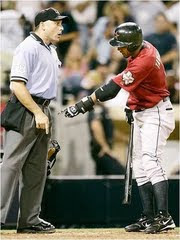The importance of numbers is important in all aspects of life, not just baseball. I'm currently watching the entire series of The Wire. In the show stats are used outside Orioles games (the show takes place in Baltimore), mainly in the police department and the educational system. Under pressure to reduce the negative stats, both departments skew their stats to help their numbers. It's called "juking the stats".
It's well documented about the problems of the No Child Left Behind Act, most notably in the book Freakonomics (and in Season 4 of The Wire). The Act forces States to administer tests and how the students of the test perform is the basis of school funding. However, one man, like Bill James looking at Runs and RBI's, took at look at how the No Child Left Behind Act and how it's run and decided to speak out against it.
Here's an article about sabermetrics and the educational system:
A recent quote on Twitter from an article by education reporter Alan J. Borsuk caught the attention of Core Knowledge blogger Robert Pondiscio: "Schools can learn from baseball. [Milwaukee] Brewers wouldn't start [pitcher Trevor] Hoffman just because he's been pitching longer."And don't worry, I didn't give anything away about The Wire if you haven't seen it
In his article, Borsuk argues that teachers should not be summarily judged based on the number of years they've been in the classroom. "It doesn't begin to tell the full story of their ability to teach."
In his blog post, Pondiscio takes that idea and runs with it. Thanks to the sophistication of baseball's number crunching, he explains, the sport is better equipped to predict the success of a player on the field than we are to determine the success of a teacher in the classroom.
Pondiscio explains that baseball has undergone a revolution in the past 25 years in which the statistical analysis of players or a team—better known by baseball fans as "sabermetrics"— is endlessly mined to determine the potential for winning.
The sabermetricians have developed individualized statistics for pitchers—known as fielding independent pitching or "FIP." These stats analyze how well a pitcher performed, regardless of his teammates' efforts. The field of education could benefit from individualized statistics like FIP, Pondiscio points out.
We are in the test scores, bromides and intangibles era of measuring teacher quality. If you're a principal, wouldn't you love to know the 'school effects' of teacher performance when it came time to make hiring decisions? Would it change your perception of merit pay if there was a classroom equivalent of FIP—the factors directly under a teacher's control? What if we could compensate teachers based on their replacement value compared to an average first year teacher?
source: http://blogs.edweek.org/







1 comments:
I have no chance of enjoying The Wire cause it has been hyped way too much. Not even King James can live up to those expectations
Post a Comment